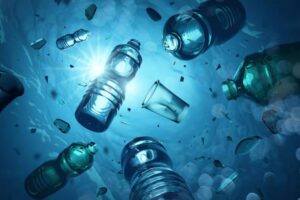We’ve heard it all before. Refuse. Reuse. Recycle. But, how much difference does it make? Are plastics really that bad? Is it worth recycling? It’s a big topic to cover so let’s break it down.
The Good
Synthetic plastics have been around for 115 years. Since then they have become a part of everyday life. Looking around me now I can’t avoid the plastic, fibres in the carpet, the chair I’m sitting on, even the laptop I’m writing this on. Plastics have become a fundamental part of society that benefit us on a daily basis. Great leaps have been made in the medical sector only made possible by the use of disposable plastic. Massive reductions in global transport emissions have been made through the light-weight properties of plastic packaging. Plastics used in construction have been instrumental for energy efficient buildings. With all the savings in carbon emissions from plastics, are they really all that bad?
The Bad
Plastics were born out of necessity for a cheap material that wasn’t easily destroyed. And therein lies it’s downfall. The benefits of plastic is it’s sheer durability. The drawback of plastic is it’s longevity. Plastics synthesised 50 years ago are still around today, and will be for the coming centuries. The effects of plastic pollution can perhaps most keenly be seen through marine pollution. About 8 million tonnes of plastic enter the ocean yearly. We’ve seen that this is forming islands of plastic that can’t degrade but instead break down into microplastics. We’re now seeing evidence of microplastics in water, soil and the food chain1.
The Ugly
Okay so here are the statistics: The global production of plastics in 2020 was estimated at around 367 million tonnes2 and we know this is increasing at an exponential rate. Of the plastic waste generated so far about 10% has been recycled3. From the life cycle of plastics, it’s estimated greenhouse gas emissions will reach 2.8 gigatonnes per year by 20504. To put that into perspective that’s about the weight of 20,000,000 blue whales in CO2 per year.
Is it all doom and gloom?
That’s a lot of plastic, mismanaged waste and emissions. It might feel that on a global scale, which bin you put your yogurt pot in is inconsequential. But I’ve not given up hope (and nor should you). There is a global movement towards research for just what to do with plastics. Bio-plastics made from plant material are becoming more readily available and (crucially) easier to recycle and then dispose of. Recycling techniques are becoming more efficient and cheaper. There have been major leaps in the research of enzymes that can biodegrade traditionally non-bio plastics5. These industry advancements have opened the door to innovators from every sector all with the aim of plastic pollution reduction.
So what can we do?
Day-to-day:
I can never say it enough, the research is very clear that no matter how efficient we are at recycling or producing plastics the number one thing we can do in our day to day life is cut down, particularly on single-use plastics. There are about to be 8 billion people in the world and raw materials to cater for all are in short supply. You can’t cut plastics out completely though so recycling really is important. It’s been shown that producing plastics from recycled material can cut energy consumption by 40-80%, and global warming potential by around 70%6. We are more efficient at producing plastics through recycling and the more we use recycling schemes the more widespread they become.
Volunteering, some great ways people have been volunteering around Shropshire:
Litter picking in coracles!?: https://www.shropshirewildlifetrust.org.uk/rivers/love-your-magnificent-severn
Taking to the streets: https://www.shropshirelive.com/news/2022/06/14/plasticfree-wellington-hits-the-streets/
The Million Mile Clean: A campaign that makes reducing plastic pollution as easy as possible. Log your miles reducing plastic pollution or even join a beach clean while on holiday. Check out the campaign here: https://beachcleans.org.uk/about/
Perhaps you’ve been inspired beyond volunteering? The following article goes through how to talk to your local MP about the reduction of plastic pollution:
https://campaigning.friendsoftheearth.uk/plastics/lobby-your-mp-and-local-authority
Let us know if you know any more volunteering opportunities and ways to get involved!
References:
- Cverenkárová K, Valachovičová M, Mackuľak T, Žemlička L, Bírošová L. Microplastics in the Food Chain. Life. 2021; 11(12):1349. Available online: https://www.mdpi.com/2075-1729/11/12/1349#cite
- Tiseo I. Global Plastic Production 1950–2020. 2021. Available online: www.statista.com/statistics/282732/global-productionof-plastics-since-1950/
- Geyer R. Plastic Waste and Recycling. 2020. Available online: https://www.sciencedirect.com/science/article/pii/B9780128178805000025
- Shen M, Huang W, Chen M, Song B, Zeng G, Zhang Y. (Micro)plastic crisis: Un-ignorable contribution to global greenhouse gas emissions and climate change. Journal of Cleaner Production. 2020; 254:120138. Available online: https://www.sciencedirect.com/science/article/abs/pii/S0959652620301852
- Kaushal J, Khatri M, Arya S K. Recent insight into enzymatic degradation of plastics prevalent in the environment: A mini – review. Cleaner Engineering and Technology. 2021 2: 100083. Available online: https://www.sciencedirect.com/science/article/pii/S2666790821000434
- Association of Plastic Recyclers. Life Cycle Impacts For Postconsumer Recycled Resins: PET, HDPE, AND PP. 2018. Available online : https://plasticsrecycling.org/images/library/2018-APR-LCI-report.pdf


Recent Comments